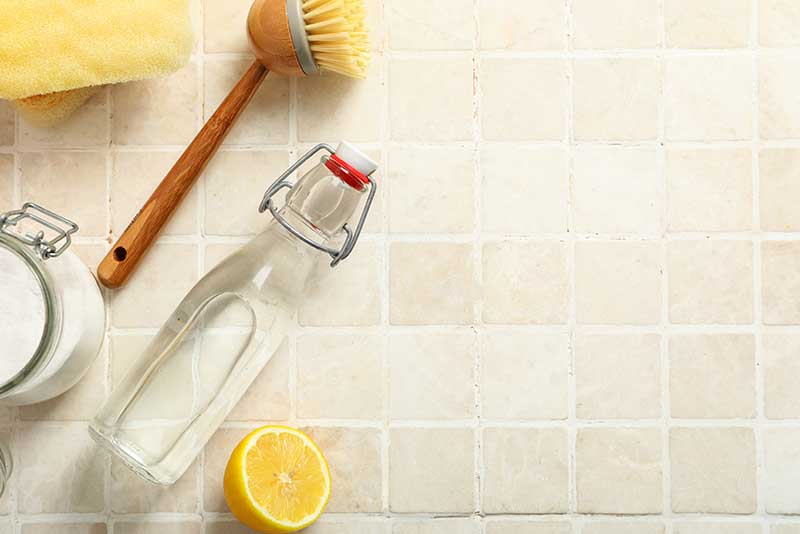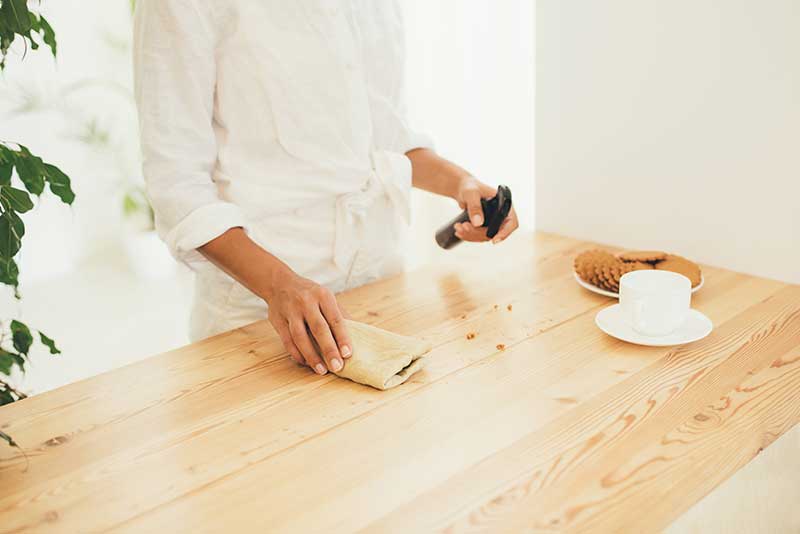In today’s world, where health and environmental consciousness are on the rise, it’s crucial to pay attention to the products we use in our daily lives. While we often focus on organic food and natural skincare, one area that is often overlooked is floor cleaning. Traditional commercial floor cleaners may contain harsh chemicals that not only impact our health but also harm the environment. That’s why embracing a chemical-free and eco-friendly approach to floor cleaning has become increasingly important. By using homemade floor cleaners made from common household ingredients, we can maintain clean and sparkling floors while protecting our well-being and the planet.
Benefits of Homemade Floor Cleaners
Why choose homemade floor cleaners over commercial products? Well, let’s highlight some of the advantages:
Chemical Free And Safe –
First and foremost, homemade floor cleaners offer a safer alternative to dangerous household cleaners you need to avoid. They are free from harsh chemicals that can irritate the skin and respiratory system. Instead, they utilise common household ingredients that are natural and non-toxic.
Cost Effective –
Apart from being safe, homemade cleaners are also cost-effective. With the use of ingredients readily available in our kitchens, such as vinegar, baking soda, lemon juice, and essential oils, we can create effective floor cleaners without breaking the bank.
Environment Friendly –
Moreover, reducing chemical exposure is beneficial for both our health and the environment. DIY floor cleaners help minimise chemical exposure, promoting better indoor air quality and reducing the risk of allergies or sensitivities. By choosing an eco-friendly lifestyle, we contribute to a healthier environment by reducing the release of harmful chemicals into waterways and ecosystems. It’s a small but significant step towards a more sustainable lifestyle.
Essential Ingredients for DIY Floor Cleaners
Now that we understand the benefits, let’s explore the key ingredients commonly used in natural floor cleaners:
- Vinegar: Known for its antibacterial properties and ability to cut through grease and grime, vinegar is a staple ingredient in many DIY floor cleaner recipes.
- Baking Soda: This natural deodorizer and mild abrasive helps remove stains and odours without scratching surfaces.
- Lemon Juice: Acting as a natural disinfectant and grease-cutter, lemon juice adds a fresh scent to your floor cleaner.
- Essential Oils: These oils, such as lavender or tea tree oil, provide additional antibacterial properties and offer a pleasant fragrance to the floor cleaner.
These ingredients are easily accessible and can be found in most grocery stores, health food stores, or online retailers. What’s more, they are versatile and can be used in various DIY cleaning recipes, such as all-purpose cleaners or window cleaners.
DIY Floor Cleaner Recipes
Now, let’s get our hands dirty and explore some natural floor cleaner recipes using the mentioned household ingredients. Here are a few recipes tailored to different types of floors:
1. Homemade Floor Cleaner for Tiles:

Ingredients:
- 1 part vinegar
- 3 parts warm water
- A few drops of essential oil (optional)
Instructions:
- In a bucket, mix together the vinegar and warm water.
- If desired, add a few drops of your favourite essential oil for a pleasant scent.
- Dampen a mop or cloth in the solution, making sure it’s not soaking wet.
- Begin mopping the tiles, paying attention to any dirty or stained areas.
- Rinse out the mop or cloth as needed and continue mopping until the entire floor is cleaned.
- Once finished, rinse the tiles with clean water to remove any residue.
- Allow the tiles to air dry completely before walking on them.
2. Homemade Floor Cleaner for Hardwood:

Ingredients:
- 1 cup warm water
- 1/4 cup lemon juice
- 1/4 cup olive oil
Instructions:
- In a spray bottle, combine the warm water, lemon juice, and olive oil.
- Shake well to mix the ingredients thoroughly.
- Lightly mist the solution onto a microfiber mop or cloth.
- Gently clean the hardwood floors, making sure not to oversaturate the wood.
- Allow the floor to air dry.
3. Natural Floor Cleaning Recipe for Laminate:
Ingredients:
- 1/2 cup distilled water
- 1/2 cup rubbing alcohol
- 1 tablespoon white vinegar
Instructions:
- In a spray bottle, combine the distilled water, rubbing alcohol, and white vinegar.
- Shake the bottle well to ensure the ingredients are thoroughly mixed.
- Lightly spray the solution onto the laminate floor, covering a small area at a time.
- Use a microfiber mop or cloth to gently clean the floor, removing dirt and grime.
- Pay attention to any stubborn stains and give them a little extra cleaning effort.
- After cleaning, dry the floor with a clean, dry cloth to prevent any excess moisture from sitting on the surface.
Remember, before using any natural floor cleaning recipe, it’s essential to test it in a small, inconspicuous area to ensure compatibility with your specific flooring material.
Tips for Effective Floor Cleaning
Now that we have our DIY floor cleaners ready, let’s explore some tips and techniques for achieving optimal results:
- Proper Floor Preparation: Before mopping, sweep or vacuum the floor to remove loose dirt and debris. This ensures a cleaner surface and prevents scratches during mopping.
- Mopping Techniques: For hardwood floors, use a damp mop or cloth rather than soaking the floor. For tiles or laminate, a slightly wet mop is acceptable. Avoid excessive moisture to prevent water damage or warping.
- Frequency of Cleaning: The frequency of floor cleaning depends on the level of foot traffic and spills in your home. Generally, it’s recommended to clean high-traffic areas at least once a week and less frequented areas every two weeks.
- Maintenance Tips for Different Flooring Types: Protect your floors by using doormats at entrances to trap dirt and prevent it from spreading. Wipe up spills promptly to avoid stains and remove shoe marks using a gentle cleaning solution.
- Addressing Common Floor Cleaning Challenges: For stubborn stains, make a paste using baking soda and water, apply it to the stain, and let it sit for a few minutes before scrubbing. For greasy residue, add a small amount of homemade dish soap to your floor cleaner solution. To restore shine, consider buffing hardwood floors with a soft cloth or using a floor polish specifically designed for your flooring type.
Remember, it’s essential to follow the manufacturer’s instructions for your specific flooring material and avoid abrasive or acidic substances that may damage the surface.
Conclusion
By embracing homemade floor cleaners, we not only maintain clean and sparkling floors but also prioritise our health and contribute to a more sustainable environment. These natural alternatives offer numerous benefits over commercial products, including safety, cost-effectiveness, and reduced chemical exposure. With readily available ingredients and simple DIY recipes, it’s easier than ever to transition to chemical-free floor cleaning.
So, let’s bid farewell to the harsh chemicals and embrace a greener approach to floor cleaning. Give these floor cleaner recipes a try and see the difference for yourself. Together, we can create a healthier home and a healthier planet.
Remember, a clean floor is just the beginning of a chemical-free and eco-friendly lifestyle. For more tips, recipes, and information on health and wellness, be sure to explore our blog and join us in our mission to live a life of less chemicals and a more earth-friendly existence.
Now, let’s get ready to mop our way to a cleaner, safer, and more sustainable home!

Priyanka Khurana Goyal is a prominent Indian figure renowned for her diverse accomplishments and contributions across various fields.. Read more



